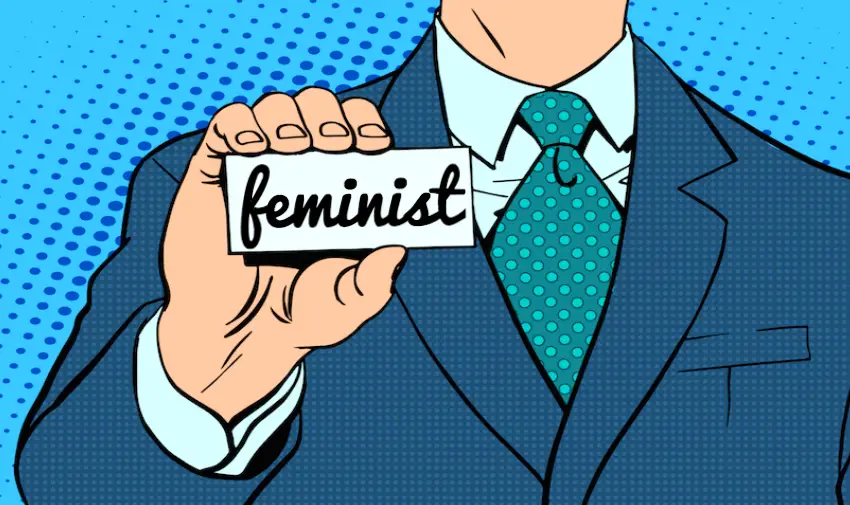The Sexism Is Complimentary
Whether they mean it maliciously or not, attributing desirable traits to masculinity is an old habit that needs to be addressed.
By Molly Flynn, University of North Carolina at Charlotte
My husband has worked for the fire department for a few years now.
There are many amazing things about his job, but traditionally, the jobs at the fire department have been held predominately by men. Of course, that is no longer the case but as a result of the rich history of men in the fire department, there is a lingering man culture that encompasses the stations.
There are many men that chose this line of work, and there are now many more women who do the same and who are more or less greeted with respect and given a fair place of employment. But, while overall the environment is gender-equal, there is still a culture of masculinity that infects the rhetoric used by both men and women in the fire department.

For example, one of the female fire fighters, Fiona, is a very hard worker who consistently goes above-and-beyond for her job and for the other fire fighters around her. The other day, one of the captains was at the station and recognized her fierceness and strong leadership. Rather than tell her she was doing a good job and hey, maybe even give her a well-deserved raise, he so gracefully decides to shower her with a misogynistic compliment.
“Fiona, I’ve heard that you are more of a man than most of the men in the fire department,” the captain innocently said as Fiona politely smiled.
Okay, so this doesn’t seem that bad, right? The captain is just telling her she is doing a good job. Maybe stylistically the compliment seems a little strange, but he’s not smacking her on her ass and asking her to bring him a cold beer; I mean, for goodness’ sake, he is just trying to give the lady a compliment!
But, these uncalled for compliments are not exclusive to the fire department. Here’s another example of my own.
I met the head of security for my mall the other day, and just like when I meet most other professionals, I extended my hand to shake his. Apparently, my strong grasp took him off guard. Immediately his eyes widened and he let out a hardy chuckle. “Wow, you have a stronger hand shake than most of the men in my security here,” he admitted from his bearded mouth. I laughed and politely said something stupid about how I was raised by strong men and blah blah blah. I hate that I passively let this slide, but I didn’t start thinking about the severity of the misogynistic compliment until very recently.
While each of these stories took place at different locations and with different people, both of these examples are very similar. Each time a man has complimented a woman by telling her she is like a man. But what does that mean? Why does being strong, being a leader and being fearless make me and Fiona manly? Well, it doesn’t.
Really, there is nothing about leadership that is inherently manly or masculine. Same thing with strength and discernment and bravery. But women who are characterized by these strengths are often complimented by stripping them of their femininity. So when someone is giving a misogynistic compliment, the way I translate it is like this, “Wow, you are so strong, you’ve got the strength of a man! Because ya’ know, women aren’t strong, so rather than appreciate your femininity and learn that women can be strong, I feel more comfortable appropriating manliness upon you. It makes much more sense in my misogynistic little mind.”
While misogyny still lurks behind rhetorical corners, there have been many efforts recently to combat damaging and demeaning language used against women. Does anyone remember the ad campaign initiated by Dove called #LikeAGirl?
The video powerfully assesses what it means when someone tells another person that they are doing something “like a girl.” In the middle of the video, the screen flashes with a strong and important question, “When did like a girl become an insult?” But while prompting this question is very important, it is not complete. “Like a girl” may be insulting but in my experience, it is much less used than “like a man” and it is much more intentional.

When someone says that I am doing something like a girl, it is very easy for me to question their motives and ask them to explain themselves—which so gloriously makes the person feel awkward and want to slink away from my feminist claws. But, when someone says I am doing something like a man, the reason why it is more difficult to say something is because they believe they are genuinely complimenting me—and all the women of the world for that matter. While “like a girl” is intended to be an insult, “like a man” is intended to be a compliment. Regardless, both phrases are sexist.
Women are strong. Women are successful. Women are leaders. And so to be told that while doing all of these important things and while encompassing all of these powerful traits make us more of a man, it is also telling us that we are less of a woman.
But, being a woman is just as valid as being a man. The slick nature of the “like a man” compliment makes it even more important to talk about and to push back at. In the moment, when some lumber-jack man tells you what you are succeeding at is a result of some manly gene inside of you, it can be difficult to respond how you’d like, just like when the head of mall security told me I had a handshake like a man and I fumbled around how to respond. While I can look back and see clearly the words I wish I had spoken, misogynistic compliments are slimy and tricky and hard to respond to. But, they need to be responded to.
Next time someone tells you that you’re doing something like a man, let them know that actually you’re not. You’re doing it like yourself and that’s why you’re kicking ass.

















